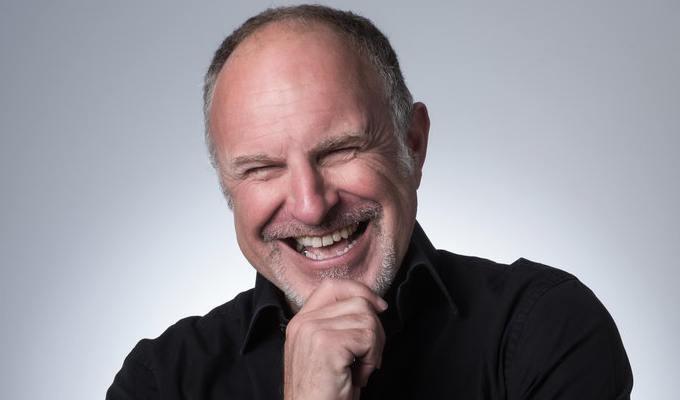Book review: Bill Hicks, Agent Of Evolution by Kevin Booth
As the prologue to this personal memoir of his lifelong friend Bill Hicks, Kevin Booth recalls one of the many times they were tripping on mushrooms on his family’s sprawling Texas ranch.The comedian, who was becoming agitated and distraught, muttered: ‘I don’t know dude. There’s just this thing, I don’t know what it is, but I’ve got thing inside me.’ He pointed to his side, near his pancreas. ‘It needs to come out; it’s like an upside-down cross.”
At that image, Booth burst out laughing – ‘sometimes everything is funny when you are tripping your nuts off’ – and nothing more was said. More than a decade later, Bill Hicks died of pancreatic cancer at the age of just 32.
It is the perfect story to reinforce the legend of Hicks as so more than a stand-up comic, but as a shamen, a visionary and a messiah for the disenfranchised.
Bill’s belief in the quasi-mystical, whether it be space aliens or the concepta higher consciousness, is a recurring theme in this collection of personal recollections. Though it is Booth’s book, it features first-person contributions from many who were close to Bill, including ex-girlfriends, close friends professional acquaintances and comedy collaborators such Dwight Slade, the friend with whom the schoolboy Hicks would sneaked out to Austin’s Comedy Workshop, with their parents’ knowledge.
Even in these early days, with a hefty share of his material ‘borrowed’ from Woody Allen, there was something special about Hicks. “He was still a teen, barely old enough to drive, but Bill was a wunderkind in an adult world, Booth writes. ‘He was already as good as the guys twice his age playing the same stage. And they knew it.’
It is in these early years that this new tome has the edge over Cynthia True’s earlier Hicks biography, American Scream. In contrast, Agent Of Evolution is rich in detail, providing an evocative portrait of life on the road for an American comic, filled with anecdotes and pinpointing Hick’s transformation from clean-living earth child to hedonistic wild man.
At around the age of 21, he suddenly switched from this moralistic, tofu-munching, teetotal hippy to a hard-drinking, drug-abusing heavy smoker who would rip the filters from his cigarettes to get the full ill-effects. And it happened in one night, when he went from never having touched a drop to slamming seven shots of tequila. Then he went on stage. It didn’t go well.
In fact, his gigs often didn’t go well, his antagonistic anti-establishment rants hardly the material the redneck middle-America crowds of his Texan homeland wanted to hear. ‘It’s somewhere between a statistical anomaly and miracle that Bill didn’t get the shit beat out of him on a regular basis,’ as Kevin Booth puts it.
Offstage, Bill, like the rest of the comics in the collective known as The Outlaws he fell into, chased the parties and the next high as much as they chased the laugh. The romantic view is that in turning to drugs Hicks was seeking mystic gateway that would enable him to see the world as it truly was. On the other hand, he was simply a young man who liked to party, and comedy made that lifestyle acceptable. Given Hick’s thwarted aspirations to be a rock and roll star – and the book goes into way too much detail about his litany of failed bands – this was the next best thing.
‘For Bill, things couldn’t get nasty enough,’ Booth writes. ‘When it came to food or sex or whatever. Nasty, nasty, nasty. More, more. Action moves were never violent enough. Porn was never graphic enough, Drugs were never strong enough. Sex was never naughty enough.’
You could see this as evidence of a man trying to living life to the full. You could also see it as a psychological void he was pathetically desperate to fill. We all have them; it just seems Bill’s is a whole heap bigger than anyone else’s.
His was not really the life of a hero, even a counter-culture one. On at least one occasion this out-of-control behaviour overspilled into domestic violence that could have so nearly turned fatal. And to its credit, this book doesn’t skimp on the more unpleasant aspects of Bill’s character.
But it doesn’t actually paint a consistent portrait of him at all. By including various, often contradictory, versions of the same event, it is hard to pin the man down. However, in some ways this is a more truthful approach to biography than claiming a definite account from an amalgam of flawed memories.
For example, Booth recalls many times when a drunk Hicks nearly killed them both, swerving through traffic at 80mph, coming within a few terrifying millimetres of catastrophe. Another contributor mentions Hicks never drove over the limit – neither speed, nor blood alcohol, presumably. Similarly, just before he died, Hicks took a two-week vow of silence (possibly as a necessity since his condition made it so difficult to talk); yet another contributor claims he spoke to Bill the day before he died.
Bill eventually cleaned his life up, but only after hitting rock bottom. He injected cocaine. Then heroin. Then crystal meth. Then, when he had run out of everything else: Jack Daniels. If you’re looking for a telltale sign that your life’s gone wrong, mainlining whisky has to be high on the list.
And as he cleaned up, his career started taking off – not least in Britain. After years of anonymity and unresponsive audiences in his homeland, his passion and brilliance were instantly recognised when, on the back of a festival-stealing performance at Montreal’s Just For Laughs event, he played the Edinburgh Fringe..
This book underplays his achievements in Blighty, which is a major flaw. Not for some sake of national pride, but because it’s an important to make the point that his flame was extinguished just as he was making the huge professional breakthroughs on this side of the Atlantic that had eluded him for so long in the States.
Instead his amazing ‘overnight’ success here get about as much page space as a particularly raucous Louisiana gig, when Bill had to be bundled out of the venue following an aggressive on-stage stand-off with a squad of provocative police officers.
But Hicks was big here, and on the verge of something bigger – although he could have blown that promise with the Counts Of The Netherworld, what sounds like a truly dreadful programme idea that would have seen him spouting his philosophies, so more than his comedy, in a fictional Edwardian salon.
In the end that project came to nought, his negotiations with interested producers at Tiger Aspect hardly helped when, during a particularly frustrating meeting in London, Hicks had a temper tantrum, leapt up onto the table and started yelling at every one there like a petulant child.
In America, his fame stems less from performances he did make, than one he didn’t: the set that was recorded for David Letterman’s show but dumped at the last minute for fears that mere mention of abortion, religion and homosexuality would enrage conservative corporate advertisers.
It was, to Hicks, a savage blow against freedom of speech. And it made him something of a martyr in the eyes of his devotees. A more pragmatic interpretation comes, as you might expect, from the show’s producer Robert Morton, who here claims that as a commercial organisation the Letterman Show simply decided not to purchase Bill’s product – the sort of decision he says he made all the time without the brouhaha the Hicks incident continues to generate today.
What gives this notorious incidence more poignancy is that it happened so close to Hicks’s death. Booth says Bill always thought he wasn’t going to live long: ‘Though he didn’t go around glorifying it like so many retarded musicians do with their dead heroes. “I’m going to life fast and die at 27, aren’t I cool.” No you’re not. Life is too precious, too beautiful.’
And Bill’s end was far from romantic. At 32, ravaged by the pancreatic cancer that has a near 100 per cent mortality rate, his body slowly and painfully shut down.
But he left a legacy few can match. He was, above all, a damn fine comedian. One of the best who has ever lived, and one who brought much-needed passion, opinion and intelligence to his work.
Yet for all those who revere him with something close to religious deovtion, this book offers a more grounded view, through the recollections of those who knew him just as their pal Bill. And while the romantic conceit of him as a tragic hero is propagated to an extent, it’s tempered by showing the man behind the jokes as all-too human, with all the failings that implies – and possibly, in his case, more so.
Bill Hicks: Agent Of Evolution, by Kevin Booth is published by HarperCollins at £18.99. Click here to buy your copy from Amazon.co.uk at £11.39
Steve Bennett
April 5, 2004
Published: 23 Sep 2006






